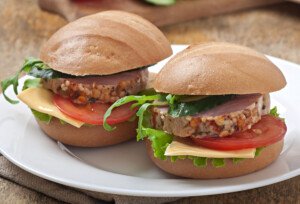Is there a way you could tell if your trouble swallowing food may be esophageal cancer rather than anxiety?
Can anxiety really cause the same type of difficulty swallowing food that esophageal cancer can?
Difficulty with swallowing is a frightening experience.
It can make you wonder if a malignant tumor is blocking things.
For some individuals, their health anxiety revolves around motor neuron disease – which can cause problems with swallowing.
For others, it revolves around cancer – of the throat and/or the esophagus.
Causes of Dysphagia Include Esophageal Cancer
“If dysphagia (medical terminology referring to sensation of the impairment of passage of ingested food and/or drink) is truly present, then in my opinion this is never due to anxiety,” says Santosh Sanagapalli, MD, a consultant gastroenterologist, endoscopist and specialist in esophageal disorders.
“This generally always requires further investigation, and especially so in a patient over 50,” continues Dr. Sanagapalli.
“Dysphagia may be due to numerous causes (but not anxiety) – including strictures (narrowings) of the esophagus, both benign and malignant; as well as esophageal motility disorders (disorders affecting the contraction and relaxation of esophageal muscles).”
Though about 88% of esophageal cancer cases are diagnosed in people over 55 years, 9.3% occurs in people 45-55, while 1.8% occurs in those 35-44, and 0.4% occurs in people 25-34.
This information comes from the NCI’s Surveillance and Epidemiological End Results Program. The SEER site shows zero diagnoses for people under 25.
Trouble Swallowing Food from Anxiety vs. Esophageal Cancer
The first few weeks after the new onset of trouble swallowing food can be terrifying, because if it’s esophageal cancer, it won’t necessarily get a LOT worse in only 14 days.
But the longer that time goes on, with no worsening of the symptom, the more reassured the patient can be that it’s not a tumor.
But if it is a tumor, it’ll grow and spread more over 14 days.
A person with what seems like difficulty swallowing from anxiety will experience an apparent difficulty that comes and goes.
Despite what seems like trouble with swallowing food – to the point where the individual may even panic and grip their throat while food is going down – the notable thing here with anxiety is that the food will ALWAYS go down, no matter what kind of food (tough steak, sandwiches, pizza, meatballs, crisp cookies).
Anxiety-driven issues with swallowing food will not eventually force the patient to start switching to softer foods.
If after two months of this harrowing symptom you’re still able to chow down steak, waffles, cereal, hamburgers, fries and Snickers bars, you probably do not have esophageal cancer.
After three months – and no having to switch to a soft food diet – this makes an even stronger case for anxiety.
You may gripe that swallowing is really hard, and you may dread every meal, but the food – your regular diet – always goes down, and NEVER comes back up — if all you have is a severe case of anxiety.
You’ve also noticed that sometimes…usually when you’re distracted while eating by a TV show or socializing, there’s no problem with your swallowing, and before you know it, you’ve snarfed down a classic sandwich.

Freepik.com, timolina
Relax! This does NOT describe esophageal cancer!
Instead, it’s a perceived problem with swallowing, brought on by tense muscles.
Anxiety about eating will further tense up the muscles, even making you feel as though there’s a knot or “lump” in your throat even when not eating.
Dr. Sanagapalli explains, “Clues that may indicate dysphagia is due to esophageal cancer include rapidly progressing symptoms, weight loss, age over 50, and dysphagia for solids but not liquids (at least initially).
Another clue is that over time, your diet has become increasingly made up of soft foods.
This means that steak is absolutely out. So are sandwiches, tacos, munchies, baked goods, apples and green salads.
Look at what’s on your plate lately. If it’s soft foods – a change in diet, see a gastroenterologist immediately, even if you’re under 50.
Food coming back up is also a worrisome symptom; the tumor eventually completely blocks food and it can only come back up (regurgitation).
“While anxiety does not cause dysphagia, it can sometimes be a contributing factor in globus sensation, which is sometimes misinterpreted by patients (or their doctors) as trouble swallowing,” says Dr. Sanagapalli.
A doctor should never tell a patient, “Your dysphagia is caused by anxiety.”
Dr. Sanagapalli explains, “I am an esophageal specialist, so I see a lot of patients with dysphagia.
“Through all these patients, I have never diagnosed anyone with anxiety-related dysphagia, and in my opinion this entity doesn’t truly exist.
“I am aware that some patients have been told by their doctor that their dysphagia is due to anxiety, but from my experience, if a proper history is taken and appropriate investigations done, the true cause of dysphagia can usually be identified.
“While anxiety is linked to a lot of gut symptoms and disorders (e.g., diarrhea in IBS), it is not a cause of dysphagia.
“I am not suggesting that all patients with dysphagia have esophageal cancer; but they all should have an identifiable cause such as a stricture, eosinophilic esophagitis or motility disorder.
“It’s never just ‘in their head’. The exception is that some patients have been labeled as having dysphagia, when on further questioning, the symptom they describe is actually globus. Globus is sometimes linked to anxiety.
“However, it is important to clarify what the patient is describing, as globus is, in fact, defined as a non-painful sensation of a lump in the throat, which typically should not impact or be affected by swallowing.”
 Dr. Sanagapalli is a gastroenterologist and director of the Esophageal Disorders Center at St Vincent’s Hospital, Darlinghurst. He performs diagnostic and therapeutic endoscopic procedures, and enjoys providing comprehensive and holistic care to patients with a wide variety of disorders affecting the gastrointestinal tract.
Dr. Sanagapalli is a gastroenterologist and director of the Esophageal Disorders Center at St Vincent’s Hospital, Darlinghurst. He performs diagnostic and therapeutic endoscopic procedures, and enjoys providing comprehensive and holistic care to patients with a wide variety of disorders affecting the gastrointestinal tract.
 Lorra Garrick has been covering medical, fitness and cybersecurity topics for many years, having written thousands of articles for print magazines and websites, including as a ghostwriter. She’s also a former ACE-certified personal trainer.
Lorra Garrick has been covering medical, fitness and cybersecurity topics for many years, having written thousands of articles for print magazines and websites, including as a ghostwriter. She’s also a former ACE-certified personal trainer.
.



































